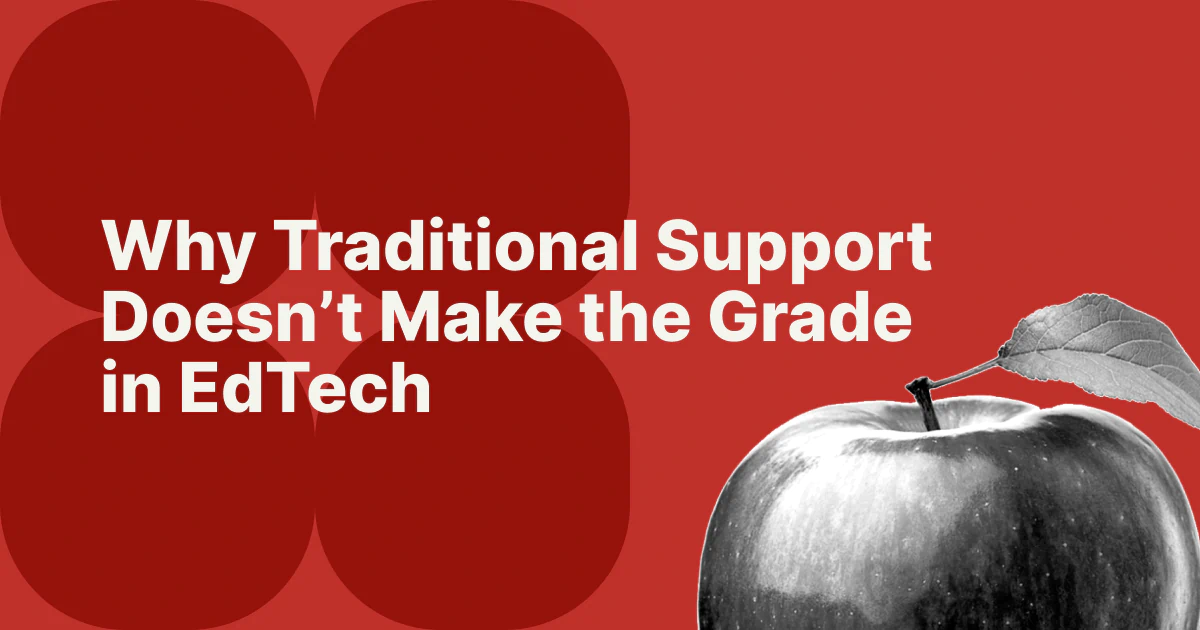Key Challenges for EdTech Support
EdTech occupies a unique position compared to other tech industries. The customers aren’t typical users. They’re students, parents, teachers, and education districts. Balancing expectations between all of these parties is complicated enough from the outset. Throw support into the mix, and that complexity multiplies.
EdTech Support is Typically Predictable but Intense
In many support teams, predictability is the biggest hurdle to clear. You can’t always predict when and where surges will happen.
In edtech, it’s (usually) the opposite. The volume is typically predictable, based on the academic calendar, assessment weeks, new course launches, testing schedules, and other planned events.
Despite this predictability, it remains extremely challenging. The surges can triple the volume of inquiries overnight, last for several weeks to a month or two, and then drop back down just as quickly. Finding a support solution that can scale with such surges is no easy task whether you're trying to solve it in-house or with outsourcing.
Budget considerations lurk in the background. Educational institutions operate on rigid timelines, with spending patterns that reset annually. Projects that depend on one-time funding can leave teams scrambling for resources and solutions just as demand is about to climb again.
Educational Compliance Is High-Stakes and Specific
Data privacy is now top of mind for everyone: edtech companies, educational institutions, and parents alike. Regulations include COPPA 2.0 and FERPA. Existing laws continue to be subject to legal interpretation. And new laws are passed all the time. For an industry that often has minors using its products, compliance is critical. That means support systems now need to account for data governance at a whole new level: encryption standards, access protocols, and audit readiness.
As schools, students, and parents demand more transparency and accountability, edtech support policies and processes are under scrutiny.
Where Traditional Models Fall Short
Companies in the industry often turn to BPOs for outsourced support, hoping it will help mitigate these challenges. But traditional, old-school support models don’t meet the needs of edtech.
Fixed FTE models are inefficient at best
Most BPOs struggle with the same thing that in-house teams do: both depend on full-time employees who work 8-hour shifts. But support inquiries – especially in edtech – don’t arrive at an even clip throughout the day. You might have a few hours during the day when tickets spike, and other hours when they dwindle. Of course, a single agent can cover 8 hours of volume over the course of a shift, but what if you need it all during an hour or two when the students really need help?
With the FTE model, you have two choices:
- Staff for the baseline and accept that spikes will cause backlogs that the team will eventually (hopefully) burn down and that CSAT will take a hit due to slow response times.
- Staff for the spikes and live with being overstaffed during the lulls.
Burn capital or squander customer satisfaction?
Flexible contracts, but only in one direction
There’s another issue with the FTE model: it makes scaling up and down difficult – a problem that’s true for both internal teams and BPOs alike. The problem? Hiring and onboarding full-time staff who you only need for a short period. BPOs address this problem in several ways – and they all cost you more. They either offer overtime hours to their agents and pass those extra costs onto you. Or they let you scale up and add more FTE, but lock you into those higher commitments leading to overstaffing and inefficiency when the surge subsides.
The law moves faster than they do
Most support providers aren’t structured to absorb the next round of privacy mandates. They typically lack internal expertise on compliance. That puts clients in a reactive position, scrambling to catch up with standards that have already shifted.
And traditional BPOs are often wedded to their proprietary tools and workflows. They’re typically less agile than purpose built tools and dedicated workflows that focus on compliance. They can’t pivot fast enough to meet real-world changes, whether that’s a new onboarding process or a shift in what data can legally be stored.
EdTech support requires a different approach
For an industry like edtech, the traditional support model is too rigid, too slow, and too narrowly focused on answering tickets rather than the broader academic landscape. Support teams need to be able to adjust to the demands of the industry, reprioritizing, updating workflows, and managing shifting costs as soon as they happen.
With the right partnership mindset, proactive approach, and modular solution, these support challenges are easily met. To understand what modular support means, what it looks like in practice, and how to implement it in your business, we can help.



